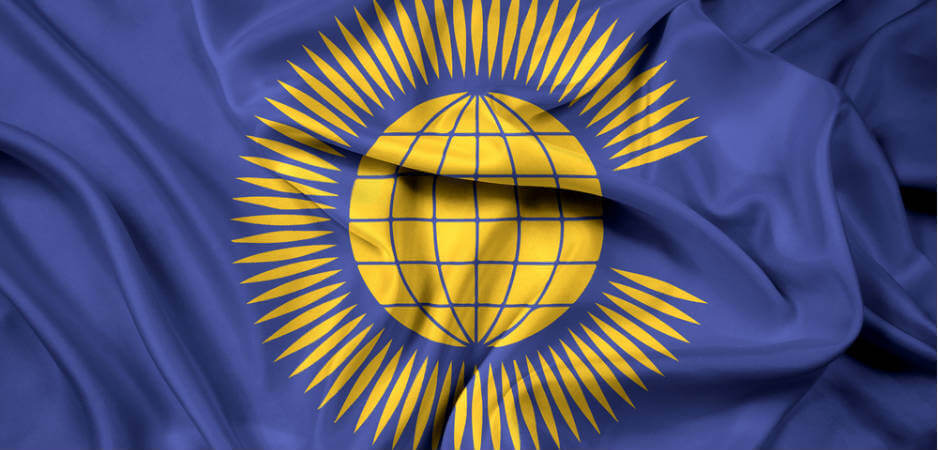With Brexit on the horizon, Britain’s relationship with the Commonwealth takes on renewed importance.
Ahead of Commonwealth Heads of Government Meeting (CHOGM), scheduled to take place in London in April, old debates have come alive over the relevance and importance of the Commonwealth of Nations and its involvement in world affairs. As alternative to the European Union post Brexit, the United Kingdom sees the Commonwealth as a global trading and international affairs network. In the absence of China, the organization provides a platform to demonstrate the credibility of aspiring global leaders like India.
A visit by Prince Charles in November 2017 to invite Prime Minister Narendra Modi to the summit to discuss India’s role in the organization shows the importance Britain bestows upon India’s strategic ambit. Subsequent visits from Tim Hitchens, chief executive of the Commonwealth Summit Unit, and Patricia Scotland, the Commonwealth secretary general, further reinforced this position.
Trade statistics from 2016 show that the UK imports from the Indian subcontinent, which encompasses India, Pakistan, Bangladesh and Sri Lanka, totalled £15.2 ($21) billion, and exports £7.7 ($10) billion. Within the rest of the Commonwealth there is a marked propensity for an Indo-centric focus in trade. For instance, trade between India and South Africa now stands at around $20 billion, and between India and Nigeria at around $10 billion. Adding up trading configurations between other African and South Asian countries would definitely prove what is more obviously felt than said — that the trading heart of the old empire is still evolving.
In 2016, during the House of Commons debate, former Defense Minister Lord Archie Hamilton asserted that the limitations in the EU competence clause is the biggest obstacle in the UK-India trade, and that after Brexit its removal will boost bilateral trade between the two countries. India is seen as a preferred partner by the UK for obvious reasons. According to the joint statement released after the India-UK Summit in New Delhi in November 2016, India was the third largest investor in the UK and the second largest international job creator: Indian companies having created over 110,000 jobs in Britain. Furthermore, India is also considered a key target market, with recent forecasts by the London Chamber of Commerce suggesting that a deal could boost UK exports to the country by 50%. Furthermore, if one considers trade statistics, Brexit doesn’t appear to have much of an effect on India-UK trade.
As per the House of Commons briefing paper on migration issued in October 2017, in 2015 43% people immigrating to the UK were nationals of other EU countries, while 44% came from outside the European Union. Around 17% of all migrants are from three countries alone: India, Pakistan and Bangladesh.
The Indian subcontinent is by far the most strategic region driving the dynamics of the Commonwealth. What happens here is more relevant to the future of both the United Kingdom and the Commonwealth as a whole.
Coincidence or Good Timing?
Britain’s triggering of Article 50 of the Lisbon Treaty following the June 23, 2016, referendum came almost a year after the Malta CHOGM of 2015. The 2018 London CHOGM comes almost one year ahead of Britain’s final departure from the EU on March 29, 2019. In the absence of a clear government strategy, the EU referendum decidedly put the UK on a rough, and apparently unstable, path of destiny. But it does not have to be that way. While the immediate aftershock of the referendum was that of a freefalling pound, which remained at a historic 10% low against the US dollar and at 15% against the euro, it seems that the immediacy of the doomsday predictions were balanced with a steadier economic growth (1.8% in 2016), second only to Germany’s 1.9% in the G7. The UK economy has continued to grow at almost the same rate in 2017. Crucial negotiations centering around what Brexit would mean in reality are still in the making.
With this backdrop, CHOGM 2018 opens a window of opportunity for both the United Kingdom and its Commonwealth cousins to essentially rebuild the Commonwealth in such a manner as to transform both in ways hitherto unimagined. The Commonwealth, thanks to a combined economy of more than $10 trillion and an annual growth in excess of 4%, provides a perfect platform for achieving these aims and is probably one of the best alternatives to manage a post-Brexit scenario for Britain.
The UK, thanks to historic and institutionalized connections with its former colonies, is better positioned as a ring leader, capable of successfully integrating international trade — particularly the small and medium sized enterprises (SMEs) seeking new markets — into a global trade regime than most other countries, except maybe the United States. It would be wise to not forget that the Commonwealth can boast the fact that half of the top 20 global emerging cities are located within its jurisdiction and that average trade costs between Commonwealth countries will be lowered by 19%.
As a strategic recourse to the systemic uncertainties and instabilities caused by Brexit, the United Kingdom can now act strategically and utilize its position as the chair of the Commonwealth to create a system that will assist member states in integrating more fully into a fairer and more equitable global trading regime. Opening markets and by ensuring mobility of productive factors across a fair, value-based ecosystem will help UK SMEs and financial institutions to enter new markets and boost innovation, growth and job creation.
The Roadmap
There are talks going on to host a Commonwealth trade hub in India to promote commerce and investment across the organization. But it is high time that the Commonwealth leadership wakes up to the fact that the systems that govern the prospects of individual prosperity ought not to be only economic in nature. Rather, prosperity is the ability of the state system to enable the individual to live with pride and human dignity. Access to nutrition, shelter, health, education and an otherwise decent living is all part of the prosperity that we understand.
If the UK wants to make the Commonwealth more relevant under its leadership, it must focus on the following areas that will play an important role in making the idea of the Commonwealth work for the people of the Commonwealth. First on the list is employment. With the desire to be connected to the global networks of talent and productivity, everyone is both wary and eager for employment, not only in the service industry, but also as entrepreneurs. The Commonwealth could be a platform that gives structural support for building and connecting markets for both. For instance, more than half of the small nations within the Commonwealth (31 out of 52) are Small Island Developing States, where development is being adversely affected by their remote locations.
This leads to the second point, connectivity: People want to travel and connect. This is a rising vector of an inalienable right in the global consciousness. The Indian subcontinent is well connected to global networks, but attention is needed for upgrading the existing land-based transport infrastructure such as roads and railways, among the Commonwealth countries. It will not only affect social development but will also give much needed structures for an economic boost in the region. Also, post-Brexit, the UK will not be bound by the free movement of workers laws, and there is an opportunity to ease visa restrictions to fill the skill gap from the Commonwealth countries. At the very least, visas for students and professionals from the Commonwealth looking for job in the UK could be fast-tracked.
Third, power and energy: Both people and institutions are energy-hungry. At this moment, countries in the Indian subcontinent depend on a single source to provide more than 50% of total their individual electricity generation. Thus, India produces 67.9% of the region’s coal, Nepal nearly 100% of the subcontinent’s hydropower, Bangladesh provides 91.5% of its natural gas and Sri Lanka 50% of its oil. Sustainable, eco-friendly, affordable and accessible energy needs have to be met if systemic balances are to be achieved in the long run.
Fourth, technology: Any institution that wants to be relevant to the people and, consequently, draw mandates for representing them, ought to carry with itself a tangible promise of technology. This doesn’t mean the internet alone, but also applications and system support to develop ideas with solid financial underwriting.
Fifth, ecological sustainability: With 1.7 billion people, the Indian subcontinent has more people than the whole of Europe and both Americas combined. Unfortunately, that does not translate into wealth. More people are going hungry in South Asia than in Africa. There is substantial inequality in the region, especially when it comes to food supply. It is also vulnerable to the impact of global warming and climate change. Preventing the creation of more climate refugees should be a priority for the Commonwealth, with many of its small island nations particularly affected by rising sea levels. Hence, comprehensive measures and plans for the future need to be laid out, and Britain can lead the way with sustainable development and technological advancement to tackle the environmental crisis.
Sixth, a safer world and a safer Commonwealth: Attacks on civil liberties, free speech and restrictions on civil society are growing across the Indian subcontinent. Based on basic human freedoms, rights and the rule of law, a society free from fear and persecution should be a steady goal throughout the Commonwealth. The organization should work harder to enforce the practical realizations of the core values of human rights enshrined in its charter. The Commonwealth as an institution has been rather successful in setting democratic, legal and human rights standards for the world to follow. But it is time that the Commonwealth wakes up to the desires of the ambitious young minds of its member states and takes cognizance of the need to both contribute and belong.
Ball in St. James’ Court
It is impossible for the governments to do everything. There has to be a partnership between the private and the public sectors to optimize the resources and possibilities available at our disposal. Instilling a component of trust among the nations party to such a grand design is crucial in this regard. The Commonwealth leadership must demonstrate a determined and forward-looking approach to bringing peace and prosperity to the Indian subcontinent, which, despite its glorious past, remains the least integrated in the world. The Commonwealth Charter has already taken note of civil society. It is time that innovation — both as an idea and a platform — is taken as an operational pivot.
Brexit is looming ever larger. New negotiations and new priorities are being conceptualized. This is the best time for the United Kingdom to repackage the Commonwealth as an organization “for the members, by the members and of the members.” The seed of a plausible sense of ownership among member states — in particular for the imagination of the youth — needs to be sown, and it should not be perceived as if benefiting just the UK or a handful of prosperous countries. Existential issues central to the people of the Commonwealth need to be addressed. Learning from the Indian subcontinent and what is happening there, and reflecting the substance of that learning across the plethora of platforms and institutions that the Commonwealth provides, could help create a mechanism that can solve problems for the long term.
There was an ancient proverb, “You are, therefore, I am; and since I am, therefore, you are.” The best network is not a cartel of petrochemicals and weapons. Rather, it is the network of intelligent minds working together.
The views expressed in this article are the author’s own and do not necessarily reflect Fair Observer’s editorial policy.
Photo Credit: / Shutterstock.com
Support Fair Observer
We rely on your support for our independence, diversity and quality.
For more than 10 years, Fair Observer has been free, fair and independent. No billionaire owns us, no advertisers control us. We are a reader-supported nonprofit. Unlike many other publications, we keep our content free for readers regardless of where they live or whether they can afford to pay. We have no paywalls and no ads.
In the post-truth era of fake news, echo chambers and filter bubbles, we publish a plurality of perspectives from around the world. Anyone can publish with us, but everyone goes through a rigorous editorial process. So, you get fact-checked, well-reasoned content instead of noise.
We publish 2,500+ voices from 90+ countries. We also conduct education and training programs
on subjects ranging from digital media and journalism to writing and critical thinking. This
doesn’t come cheap. Servers, editors, trainers and web developers cost
money.
Please consider supporting us on a regular basis as a recurring donor or a
sustaining member.
Will you support FO’s journalism?
We rely on your support for our independence, diversity and quality.








